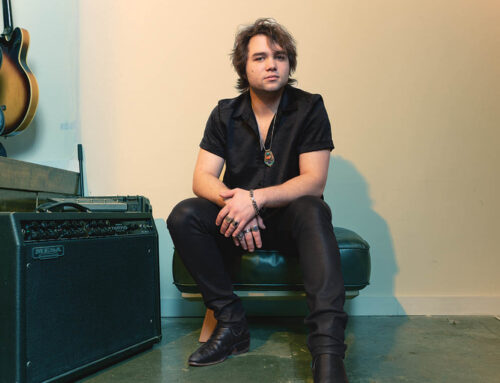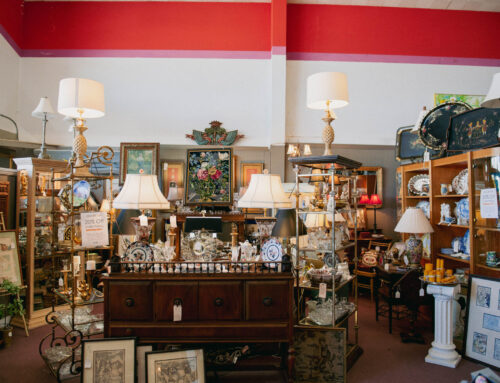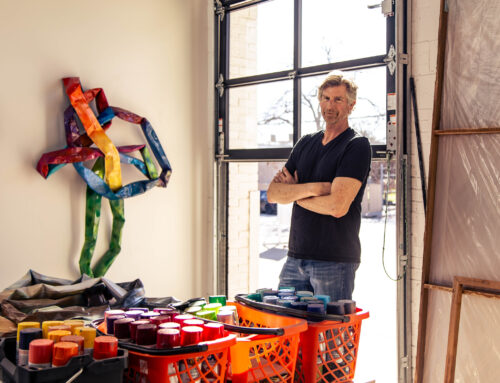“Being a woman is the number one risk factor for breast cancer,” says the Susan G. Komen Breast Cancer Foundation. And because breast cancer touches the lives of nearly 200,000 women each year, it’s no surprise that many women in our neighborhood have battled this disease.
Three who have won the battle are Kay Porter, Blanche Weinberger and Linda Northwick. They agreed to share their stories, hoping not only to inform us about the risks of cancer, but also to give hope to those who are fighting the disease.
“I became involved with the Komen Foundation to help in the quest to eradicate breast cancer as a life-threatening disease so that [my niece] Kathryn will never have to hear the words that she has breast cancer,” Porter says.
For information about breast cancer support groups or for details about the Komen Race for the Cure in Dallas Oct. 19, visit www.komen-dallas.org or www.komen.org.
Though Kay Porter’s breast cancer was diagnosed “very, very early” during a mammogram in May 1994, at her doctor’s urging she opted to have a complete mastectomy and reconstruction rather than undergo chemotherapy and radiation.
What was the most difficult part of your diagnosis/treatment?
I handled everything pretty well until I was at my plastic surgeon’s office, and he was drawing where he and my general surgeon would be making the incisions, and taking pictures for a “before” and “after.”
That’s when it really hit me that I had cancer, and I was going to undergo a huge change in my life, in my daily routine and my perspective. For instance, being at the office from 7 a.m. to 7 p.m. was no longer a priority. I learned to say “yes” to offers of help. And like many people who face a life-threatening situation, I looked to the Lord for help and support.
Luckily for me, my life was not built around my physical appearance. Yes, I like to look my best, but my bust size has never been an important factor in my self-esteem. Having the mastectomy has not affected me emotionally; however, the surgery left some physical side effects such as numbness in some areas.
My family and friends were with me every step of the way. I work for a wonderful company (Southwest Airlines), with locations across the country, and I received cards with good wishes and prayers the entire time I was out on leave.
I did not seek other breast cancer survivors per se, but I am blessed to know so many of them through my work in Irving and with the [Susan G. Komen] affiliate. Many of them have become lifelong friends, based on our experiences and our work.
What words of encouragement would you offer other women?
Breast cancer does not have to be a death sentence. Early detection is the key to survival. I am an advocate of monthly self-examination, a yearly clinical exam by your physician and mammograms beginning at age 40.
Did you return to a normal routine following treatment? In what ways has your life changed?
My life changed – for the better. I quit smoking. I took a job with less stress and travel, which in turn allowed me to have time to have a life outside the job. I also found a church home.
Of course, my “normal” is not what my normal was prior to my diagnosis. However, getting back to a routine that does not include visiting doctors is a great spirit booster.
I am much more positive, and I thank God for each day. I take nothing for granted, and I have quit saying “someday.” Someday is now.
Do you participate in any volunteer work/activities now in the fight against breast cancer?
I began volunteering with the Mammogram Foundation of Irving (an organization that provides free mammograms for women who live, work or go to school in Irving). I am a member of the advisory committee for the Dallas County affiliate of the Susan G. Komen Foundation, a member of the Komen Dallas Race for the Cure committee, and also a trustee for the Jim and Joanie Hatcher Charitable Trust. (Joanie was the first survivor chair of the Dallas County affiliate of the Komen Foundation, and she lost her battle with breast cancer in 1996.)
Kay Porter is a 27-year employee of Southwest Airlines with a bachelor’s degree in music education from West Texas A&M. When not at work, she spends her time volunteering and visiting family in her hometown of Amarillo.
Following a regular mammogram, sonogram and biopsy in 1998, Blanche Weinberger learned she had breast cancer. She underwent a lumpectomy and had seven lymph nodes removed. Afterward, her tumor still proved “very aggressive,” and, when further surgery was required, she faced a tough decision.
What was the most difficult part of your diagnosis/treatment?
My sister had died from breast cancer in 1987 at the age of 70, three years after her lumpectomy and radiation treatments. After much thought, I chose to have the affected breast, plus the other breast, totally removed rather than [undergo] another lumpectomy and radiation or remove just one breast.
My sister’s death certainly influenced my choice to go ahead and remove both breasts totally. [She] was 15 years older than I was when she died, and my breast cancer hit at the same age that hers hit her.
I have never regretted that decision. Even though losing both breasts is initially a terrifying and certainly image-altering event, the fear of a recurrence in the other breast and dying from cancer would be much worse. I knew that I would rather feel well and survive no matter what my body looked like. (I jokingly say that it was time to give up any dreams of topless dancing anyway.)
There were moments, of course, when I felt depressed, but those didn’t last long. My breasts were a part of me, of course, but only a part of my person. There is just so much more to me, and to life.
I have currently made it through 4 ½ years cancer-free, and I feel great. The prognosis is very good. I continue to see the oncologist and surgeon every six month, but all tests are great, and the future is very bright.
Did you return to a normal routine following treatment? In what ways has your life changed?
I am back to a schedule that would daunt a 25-year-old, and I was 70 in September. I work part time with my public relations business, I’m a student at Brookhaven College in art, we travel, I paint, I play bridge, I play Mah Jong, I have many, many friends, and I volunteer with Komen, plus other causes. I take care of my house and my husband and my rose bushes, we have five kids, seven grandchildren and one great-grandchild.
I continue to celebrate my “survival anniversary” every year. I feel my life has been enriched and enhanced by the experience of breast cancer. I appreciate my wonderful, supportive and loving husband even more than before. I appreciate my generous and caring friends more than before. I appreciate my loved ones even more than before. I appreciate my life even more than ever.
I wake up every day joyously grateful to be here…and I appreciate the opportunity to help others who are facing breast cancer in any way that I can.
Blanche Weinberger has lived in Dallas throughout her life, attending Hockaday and SMU. She served as senior account executive at Tracy-Locke Advertising before opening her own public relations company and has been an active volunteer in the community for years.
Linda Northwick was diagnosed in 1993 after a lump was found in her left breast during her yearly checkup. A mammogram and sonogram confirmed the suspicions of her doctor, and a lumpectomy was performed. The cancer had not spread to her lymph nodes, and she underwent six weeks of radiation. She’s still cancer-free.
What was the most difficult part of your diagnosis/treatment?
The most difficult part was hearing the words “breast cancer.” I thought cancer automatically meant a death sentence.
My husband, Chuck, who is also my best friend, got to work immediately and gathered all the facts and all the options available.
I also had an incredible team of doctors who were very straightforward, patient and compassionate. A big thank you to Dr. David Bookout (OB/GYN), Dr. W. Lee Bourland (surgeon), Dr. Margaret Sunderland (oncologist) and Dr. Timothy Nichols (radiologist).
What words of encouragement would you offer other women?
Don’t be afraid of the words “breast cancer.” If caught early on, it is highly treatable. So get a mammogram!
Did you return to a normal routine following treatment? In what ways has your life changed?
I returned to my normal routine and job. A plus was that I initially lost quite a bit of weight, so to keep it off I started exercising regularly and am probably much healthier today than before.
Although a cliché, I truly no longer sweat the small stuff, and I try to remember to smell the flowers.
Do you participate in any volunteer activities in the fight against breast cancer?
I started about seven years ago volunteering with the Dallas County affiliate of the Komen Foundation. I am currently the membership chair and co-chair of registration operations for the 20th Dallas Race for the Cure.
Along with the support of my husband, family and friends, the Komen organization has made a positive difference in my life. I’ve made many life-long friends and hopefully have helped our cause just a little along the way.
Linda Northwick is secretary and treasurer of Humphrey-Northwick Lighting Group, a decorative lighting company, and the primary caregiver of her 89-year-old mother. She and her husband have been married 34 years.






